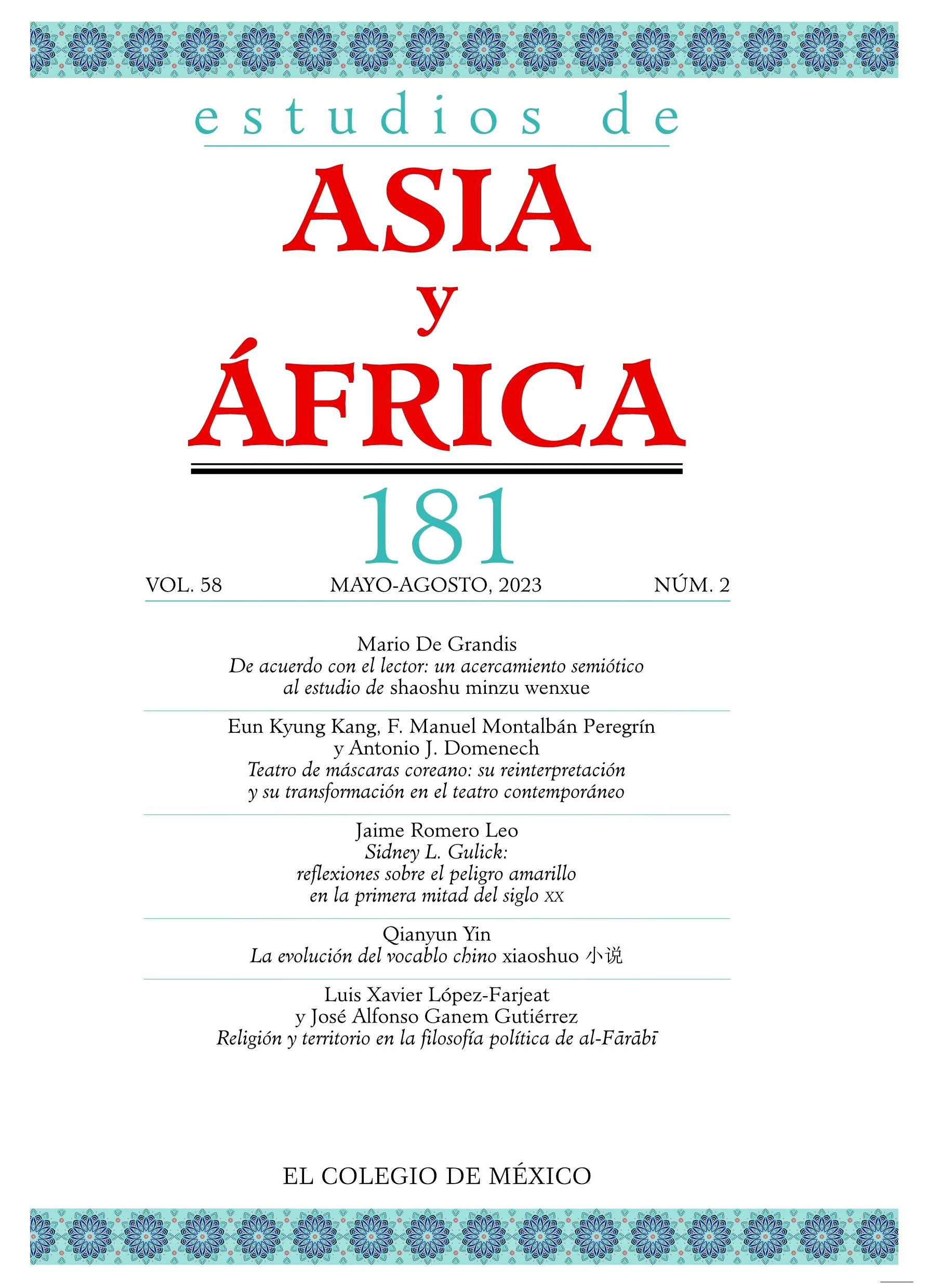Abstract
This article explores the use of the terminological pair dār al-islām/dār al-ḥarb, first, from the Islamic juridical perspective. Then, the discussion is focused on the relationship between religion (milla), nation (umma), and territory (maskan), in al-Fārābī’s political philosophy. It is highlighted that, in al-Fārābī’s approach, the dichotomy dār al-islam/dār al-ḥarb does not appear. The absence of that distinction suggests that for the philosopher religious identity is not a pre-requisite for a political community and its geographical demarcation. Therefore, it is argued that al-Fārābī’s philosophical approach rules out the division of nations based on their religious identity. Beyond the differences between legal science and philosophy, the article examines the conceptualization of al-Fārābī’s territory and its consequences for political philosophy.
References
Ahmad, Muhammad Mushtaq. 2008. “The Notions of Dār al-Ḥarb and Dār al-Islām in Islamic Jurisprudence with Special Reference to the Ḥanafī School”. Islamic Studies 47 (1): 5-37.
al-Fārābī. 1964. Kitāb al-siyāsa al-madaniyya. Editado por Fauzzi M. Najjar. Beirut: Imprimerie Catholique.
al-Fārābī. 1968. Kitāb al-Milla. Editado por Muhsin Mahdi. Beirut: Dar El-Mashreq.
al-Fārābī. 1969. Kitāb al-Hurūf. Editado por Muhsin Mahdi. Beirut: Dar el-Mashreq.
al-Fārābī. 1985. Mabādi’ ārā’ ahl al-madīnah al-fāḍilah (al-Farabi on the Perfect State). Editado y traducido por Richard Walzer. Oxford: Clarendon Press.
al-Fārābī. 1995. La ciudad ideal. Traducido por Manuel Alonso Alonso. Madrid: Tecnos.
al-Fārābī. 2004. El libro de las letras. Traducido por José Antonio Paredes Gandía. Madrid: Trotta.
al-Fārābī. 2008. Obras filosóficas y políticas [Libro de la política, Libro de la religión y Aforismos de ciencia política]. Editado y traducido por Rafael Ramón Guerrero. Madrid: Trotta.
al-Muhājirah, Umm Sumayyah. 1436 [2014]. “They Are Not Lawful Spouses for One Another”. Dabiq 10: 45-48.
Albrecht, Sarah. 2018. Dār al-Islām Revisited. Territoriality in Contemporary Islamic Legal Discourse on Muslims in the West. Leiden: Brill. https://doi.org/10.1163/9789004364578
Algar, Hamid. 1993. “Dar al-ḥarb”. En Encyclopaedia Iranica, vol. 7. Londres: Routledge & Kegan Paul. https://iranicaonline.org/articles/dar-al-harb-the-realm-of-war-lands-not-under-islamic-rule-a-juridical-term-for-certain-non-muslim-territory-though-of
Aristóteles. 1988. Política. Traducido por Manuel García Valdés. Madrid: Gredos.
Asad, Talal. 2002. “The Construction of Religion as an Anthropological Category”. En A Reader in the Anthropology of Religion, editado por Michael Lambek, 114 132. Oxford: Blackwell.
Asad, Talal. 2009. “The Idea of an Anthropology in Islam”. Qui Parle 17 (2): 1-30. https://doi.org/10.5250/quiparle.17.2.1
Brague, Remi. 1993. “Note sur la traduction arabe de la Politique d’Aristote, derechef, qu’elle n’existe pas”. En Aristote politique : études sur la Politique d’Aristote, dirigido por Pierre Aubenque y editado por Alonso Tordesillas, 423-433. París: Presses Universitaires de France.
Calasso, Giovanna. 2010. “Alla ricerca di dār al-islām. Una ricognizione nei testi di giuristi e tradizionisti, lessicografi, geografi e viaggiatori”. Rivista degli Studi Orientali 83 (1/4): 271-296. http://www.jstor.org/stable/43927080
Calasso, Giovanna y Giuliano Lancioni, eds. 2017. Dār al-islām/dār al-ḥarb. Territories, People, Identities. Leiden: Brill.
Crone, Patricia. 2004. Medieval Islamic Political Thought. Edimburgo: Edinburgh University Press. https://doi.org/10.1515/9780748646500
Donner, Fred M. 2011. “Qur’ānicization of Religio-Political Discourse in the Umayyad Period”. Revue des mondes musulmans et de la Méditerranée 129: 79-92. https://doi.org/10.4000/remmm.7085
Emon, Anver. 2012. Religious Pluralism and Islamic Law: Dhimmīs and Others in the Empire of Law. Oxford: Oxford University Press. https://doi.org/10.1093/acprof:oso/9780199661633.001.0001
Fierro, Maribel y John Tolan, eds. 2013. The Legal Status of Dimmī-s in the Islamic West. Turnhout: Brepols. https://doi.org/10.1484/M.RELMIN-EB.6.09070802050003050408050408
Friedman, Yohanan. 2017. “Dār al-islām and dār al-ḥarb in Modern Indian Muslim Thought”. En Dār al-islām/dār al-ḥarb. Territories, People, Identities, editado por Giovanna Calasso y Giuliano Lancioni, 341-380. Leiden: Brill.
Galston, Miriam. 1990. Politics and Excellence: The Political Philosophy of Alfarabi. Princeton: Princeton University Press.
Hassan, Muhammad Haniff. 2012. “War, Peace or Neutrality: An Overview of Islamic Polity’s Basis of Inter-State Relations”. Jurnal Al-Tamaddun Bil 7 (1): 115-134. https://doi.org/10.22452/JAT.vol7no1.8
Idris, Murad. 2019. War for Peace. Genealogies of a Violent Ideal in Western and Islamic Thought. Nueva York: Oxford Univer-sity Press.
Ismail, Salwa. 2004. “Being Muslim: Islam, Islamism and Identity Politics”. Government and Opposition 39 (4): 614-631. https://doi.org/10.1111/j.1477-7053.2004.00138.x
Ismail, Salwa. 2006. Rethinking Islamist Politics. Londres: I.B. Tauris.
Lewis, Bernard. 2004. The Political Language of Islam. Karachi: Oxford University Press.
López-Farjeat, Luis Xavier. 2022a. “al-Fārābī on Tolerance, Religious Pluralism, and Philosophical Exclusivism”. En Tolerance and Concepts of Otherness in Medieval Philosophy, editado por Michael William Dunne y Susan Gottlöber, 165-180. Turnhout: Brepols.
López-Farjeat, Luis Xavier. 2022b. “The Nature of Human and Nonhuman Animals in Classical Islamic Philosophy: Alfarabi and Avicenna”. En Human. A History, editado por Karolina Hubner, 102-132. Oxford: Oxford University Press. https://doi.org/10.1093/oso/9780190876371.003.0006
Mahdi, Muhsin. 2001. Alfarabi and the Foundation of Islamic Political Philosophy. Chicago: University of Chicago Press. https://doi.org/10.7208/chicago/9780226774664.001.0001
Neria, Chaim Meir. 2013. “Al-Fārābī Lost Commentary on the Ethics: New Textual Evidence”. Arabic Sciences and Philosophy 23 (1): 69-99. https://doi.org/10.1017/S0957423912000082
O’Meara, Dominic J. 2003. Platonopolis: Platonic Political Philosophy in Late Antiquity. Oxford: Clarendon Press.
Orwin, Alexander. 2017. Redefining the Muslim Community. Ethnicity, Religion, and Politics in the Thought of Alfarabi. Filadelfia: University of Pennsylvania Press. https://doi.org/10.9783/9780812293906
Parens, Joshua. 1995. Metaphysics as Rhetoric. Alfarabi’s Summary of Plato’s “Laws”. Albany: State University of New York Press.
Parens, Joshua. 2006. An Islamic Philosophy of Virtuous Religions. Introducing Alfarabi. Albany: State University of New York Press.
Rodríguez Zahar, León. 1999. “Tres aspectos del origen de la segregación de la Gente del Libro en el islam: hanifismo, umma y dhimma”. Estudios de Asia y África 34 (3): 583-622. https://estudiosdeasiayafrica.colmex.mx/index.php/eaa/article/view/1690
Shaker, Anthony F. 2021. Reintroducing Philosophy: Thinking as the Gathering of Civilization. According to Contemporary, Islamicate and Ancient Sources. Delaware: Vernon Press.
Strauss, Leo. 1952. Persecution and the Art of Writing. Glencoe: Free Press.
Syros, Vasileios. 2008. “A Note on the Transmission of Aristotle’s Political Ideas in Medieval Persia and Early-Modern India: Was There Any Arabic or Persian Translation of the Politics?”. Bulletin de philosophie médiévale, núm. 50, 303-310. https://doi.org/10.1484/J.BPM.3.597
This work is licensed under a Creative Commons Attribution-NonCommercial-NoDerivatives 4.0 International License
Copyright 2022 Estudios de Asia y África



